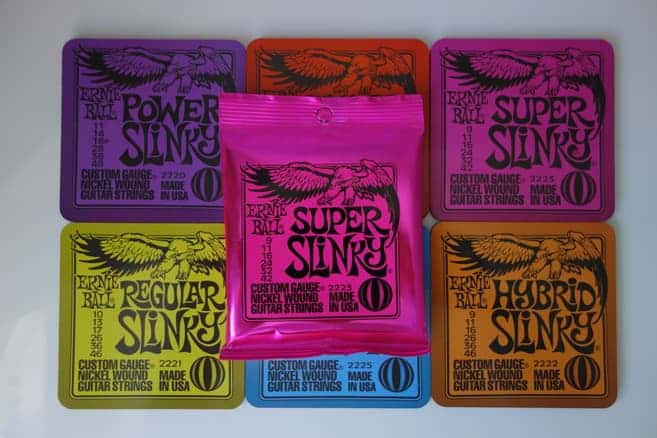
If we all turn to the back of our favorite string packet, there’s no ‘sell-by date’ in sight!
This makes sense as our strings aren’t for ‘human consumption, however, they are in a way for ‘consumption’ with our guitars to chew and spit out glorious notes.
That got me thinking about string packets and their potential ‘shelf life.’ Do unused strings lose their tone over a long period of time? Here’s what I found out…
Do guitar strings have a shelf life?
Unopened packaged strings will last for many years when kept in a cool and dry place combined with moderate temperatures and humidity. As they are comprised of nickel, copper, and steel, an iron compound that is a durable element meaning their composition lasts for many years.
Manufacturers Guidelines
Technically your unopened strings don’t have a designated ‘shelf life’ or ‘sell-by date’, however, the companies that manufacture them do have guidelines to follow.
These guidelines will ensure your unopened strings stay healthy for years to come. The first thing to be aware of when storing your unopened strings relates to your environment.
Although electric guitar strings are made from a combination of nickel and steel, it doesn’t mean you are out of the woods yet, being an iron compound is not to say that nickel won’t rust.
Therefore, the key to prolonging your unopened strings for years and maintaining performance is to maintain the environment they are stored in.
Does Enviroment Effect String Durability
The main aspect to monitor and control is your environments ‘humidity’. The reason high humidity is a problem for strings packaged in the usual paper envelopes relates to the moisture within your climate.
Humidity is a measurement of water vapor within the air, meaning the air is holding a large amount of moisture. So why is this bad for unopened strings?
The reason this is bad is a significant amount of moisture can cause ‘corrosion’ or ‘rust spots’ which can compromise the performance and tone of your packaged strings over time.
Even though to the eye your strings look sealed, the packaging is not air-sealed and doesn’t protect them from the air atmosphere which over time will ‘oxidize’ the string.
There’s nothing worse than opening a fresh packet of strings, only to realize there’s an accumulation of rust and will not sound or perform at their optimal best.
Some string companies like ‘D’Addario‘ are aware of the negative effects associated with corrosion and package their strings in a ‘VCI’ packet (Vapour Corrosion Inhibitor) which is basically a fancy way of saying a ‘sealed air-tight’ packet.
Other string companies like ‘Ernie Ball’ and ‘Elixir’ also provide packaging with air-tight seals. This vacuum removes air which decreased the chance of the strings from ‘oxidizing’ reducing the likelihood of ‘corrosion’.
Speaking of which, does string brand matter when it comes to string quality and tone? I encourage you to read my next post all around the topic of string brand.
How Long Can They Last?
Although I can’t speak on behalf of all string companies. D’Addario states their VCI packet strings unopened can last anywhere from 3-5 years without any corrosion or rust.
The strings that are not air-sealed that come with the paper envelope, however, as stated depend on the environment they are exposed in. That’s not to say the paper envelope versions can’t last up to 3-7 years.
It all depends on where they are stored and how much they are exposed to climate conditions such as humidity.
Where Should Guitar Strings be Stored?
With this knowledge on hand, I wouldn’t recommend storing strings in a basement or an attic for example where the elements are more likely to affect them depending on the season and climate you reside in.
To be safe and maintain quality, I would store them in a ‘cool’ and ‘dry’ place that’s not exposed to sunlight in the room that maintains a normal temperature all year round where the humidity is least likely to affect them.
With that said, you should not buy strings in large bulks, why? Although saving money is cool and all and trust me I’m all for it. Don’t put yourself in a position in the first place, to test the long shelf life theory out.
I would recommend having a good handful of strings on hand as when you need them depending on how many guitars you have and how many you through a year.
As a side note, Here is my guide on what to do when you break a string on a fresh set of strings.
Final Thoughts
Being an equipped guitarist means always having a fresh set of strings on hand for breaks or replacing strings past their peak tonal sound.
Unfortunately, the string packets forgotten from previous Christmas presents, birthdays presents or unfavored strings shoved to the back of drawers never to be seen again for years, will not lose their tone unless they are stored for decades.
The Bottom line is you shouldn’t worry about corrosion or rust spots if they are stored in a place that is not exposed to the elements which will ensure the freshest sound and feel when they are called upon.
Hopefully, this post answered your question, thanks for reading along.
